Custom Healthcare Staffing Software Development
Our custom staffing software integrates with your hospital’s IT systems without needing infrastructure changes.
Schedule a CallOur custom staffing software integrates with your hospital’s IT systems without needing infrastructure changes.
Schedule a CallHealthcare staffing software offers a powerful solution for both facilities and agencies. Tailored to address specific needs and optimize efficiency, this software streamlines the entire staffing process, ensuring compliance, cost-effectiveness, and quality patient care.
Custom-designed medical recruiting software caters to individual needs, roles, policies, and workflows. This includes features like automated scheduling, real-time dashboards for informed decisions, integrated HR and payroll systems, and budget planning based on patient demand.
Together, healthcare facilities and agencies experience improved efficiency, cost optimization, enhanced compliance, quality patient care, and increased staff satisfaction.
To ensure an ideal fit, our expert team can design and build HIPAA-compliant medical HR software tailored to your specific needs.
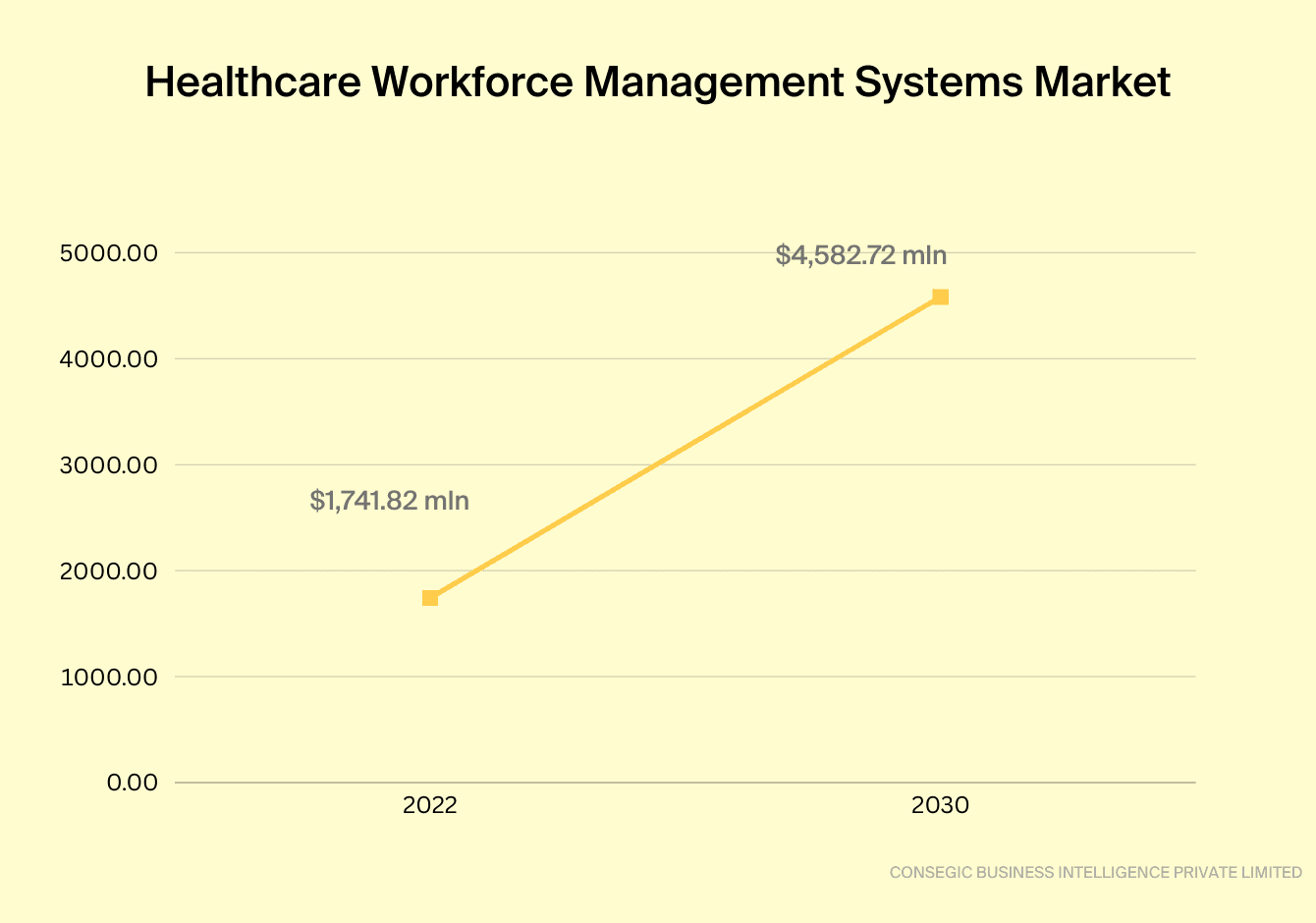
Take Full Control of Your Medical Staffing Processes
Talk to Our TeamCustom hospital staffing software development provides numerous advantages over generic systems or manual processes when managing healthcare staffing needs and issues. Some key benefits include:
Medical recruitment software can incorporate robust validation rules, checks, and controls to ensure scheduling and staff assignments comply with healthcare regulations, internal policies, union rules, and ratios. This minimizes audit risks and issues from licensing, skills, and schedules.
Extensive reporting capabilities and analytics provide actionable visibility into staffing KPIs and trends. Metrics on demand, costs, FTEs, skills, scheduling effectiveness, and more empower optimized workforce planning and data-driven decisions to control costs.
The high configurability allows customization to the organization’s unique workflows, job roles, skills taxonomy, policies, staff types, locations, and other specifics for optimal staffing management.
The organization evolves with additional locations, employees, job types, schedules, and complexity. So, the therapy staffing software platform can scale up in capabilities and capacity cost-efficiently, ensuring high performance supports growth.
Automated scheduling tools match required roles and skills to available staff for each shift, greatly enhancing assignment accuracy and efficiency. It allows manager overrides, balances labor costs, policy adherence, and job preferences.
The software connects HRIS, payroll, EMR/EHR, and time and attendance systems. It enables efficient two-way data sharing across platforms for seamless workflows. Staff data remains in sync across systems, with no duplicate manual entry.
Putting robust analytics on staffing patterns, costs, patient demand, and other workforce metrics allows data-informed decisions on improving productivity, care quality, and planning optimum staff levels and budgets for temporary and permanent needs.
Our custom software development process for healthcare organizations includes four key phases engineered to deliver flexible solutions tailored to unique staff scheduling needs:
We start projects by interviewing stakeholders and surveying end-users. We also audit current tools and manual processes. We analyze pain points and outline clear business goals. This lets us make an accurate concept. It fits the workflow priorities and needs of different hospital staff roles.
Once the Discovery phase is over, we use the info to design flexible, scalable, and interoperable solutions. This includes mapping out server infrastructure and database schemas. Also, it includes API layers to connect with hospital systems. And modular microservices-based components to support critical functions. We also create user experience storyboards catered to the various staff personas that will use the platform.
Depending on the requirements, we may develop the solution in rapid sprints, regularly demonstrating module functionality to users to incorporate user feedback. Every piece of software we build then undergoes extensive QA, including unit, integration, and regression testing across devices before release.
Once the staff scheduling solution meets all conditions and acceptance criteria, we also handle technical integration with incumbent systems, deployment on secure managed infrastructure, ongoing application support, and maintenance and enhancements to address emerging needs.
We charge based on the hours our software engineers work on your project. Any direct expenses we incur are also billed. This model fits smaller-scale or short-term initiatives that have fluctuating needs.
We assemble a software development team that works exclusively on your software project for a fixed monthly rate. This model is well-suited for long-term, complex initiatives requiring constant development work.
We provide a defined scope of work. It includes price quotes for delivering healthcare software projects by a target deadline. This lowers cost risks for clients who have concrete requirements. Changes in scope may alter pricing.
Enhance the Healthcare Staffing Process in Your Organization with Empeek’s Help.
Connect with UsOur team specializes in reliably interfacing staff scheduling systems with other critical hospital platforms. We implement secure, bidirectional integrations with:
We help vendors to enable reliable, bidirectional data flows from staff schedules and hours worked data into billing software for staffing and payroll processing systems. You can accurately generate payments aligned with hours worked, overtime hours or differential rates.
Empeek’s team designs a secure integration layer to share relevant staff credentialing data between EHR system and scheduling application to validate assignments against certification requirements in real-time during scheduling.
Learn MoreProper integration exchanges data on supplemental, temporary workers and contractors secured from external healthcare staffing agencies. The goal is to simplify demand planning and scheduling complexities stemming from managing internal and external staff in a single solution.
Robust integration synchronizes physician, nurse, and medical support staffing data with patient intake, admissions, and bed management platforms to match staffing levels optimally to patient care demands.
Learn MoreThis integration connects staff scheduling apps with existing platforms. It helps to manage confidential employee health data like immunization status or sick days used from banked time to feed data that maintains safety and informs schedule creation.
Draws in healthcare professional competency ratings, required skills for specialty units, completed training data, and continuing medical education records from existing talent management platforms to better align the highest performing resources.
This integration enables the merge between physician schedules that are maintained in the automated scheduling system with telemedicine applications to reflect availability windows for virtual consults accurately.
Learn MorePROJECT SUCCESS
Core functionality include:
Explore the Project
PROJECT SUCCESS
We’ve created web and mobile applications to help doctors and patients optimize the treatment process.
Explore the Project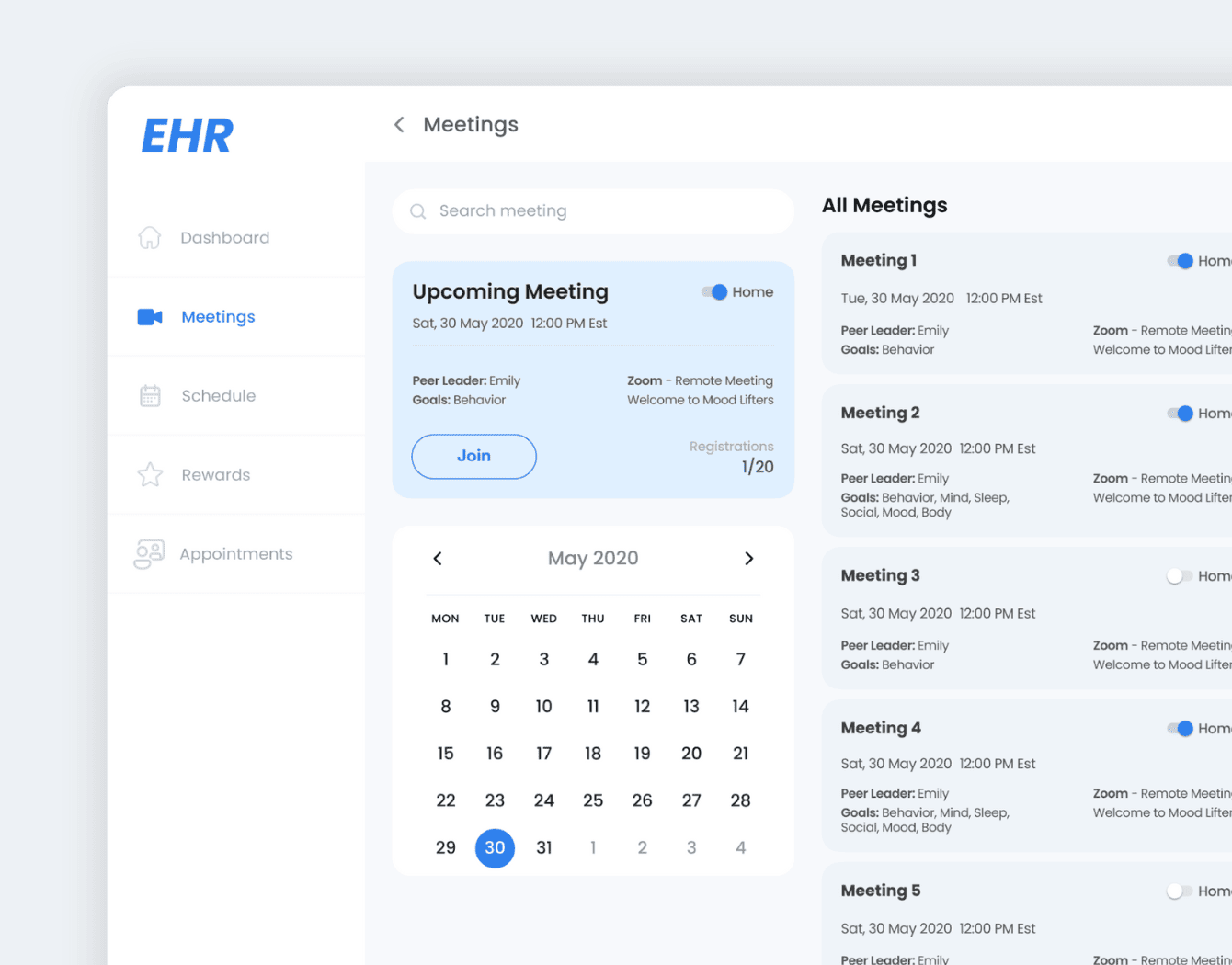
This project aims to integrate two healthcare systems, Upvio (Practice Management) and Elation (Electronic Health Record), to synchronize appointments, payment management, and enable communication between users.
Coming soon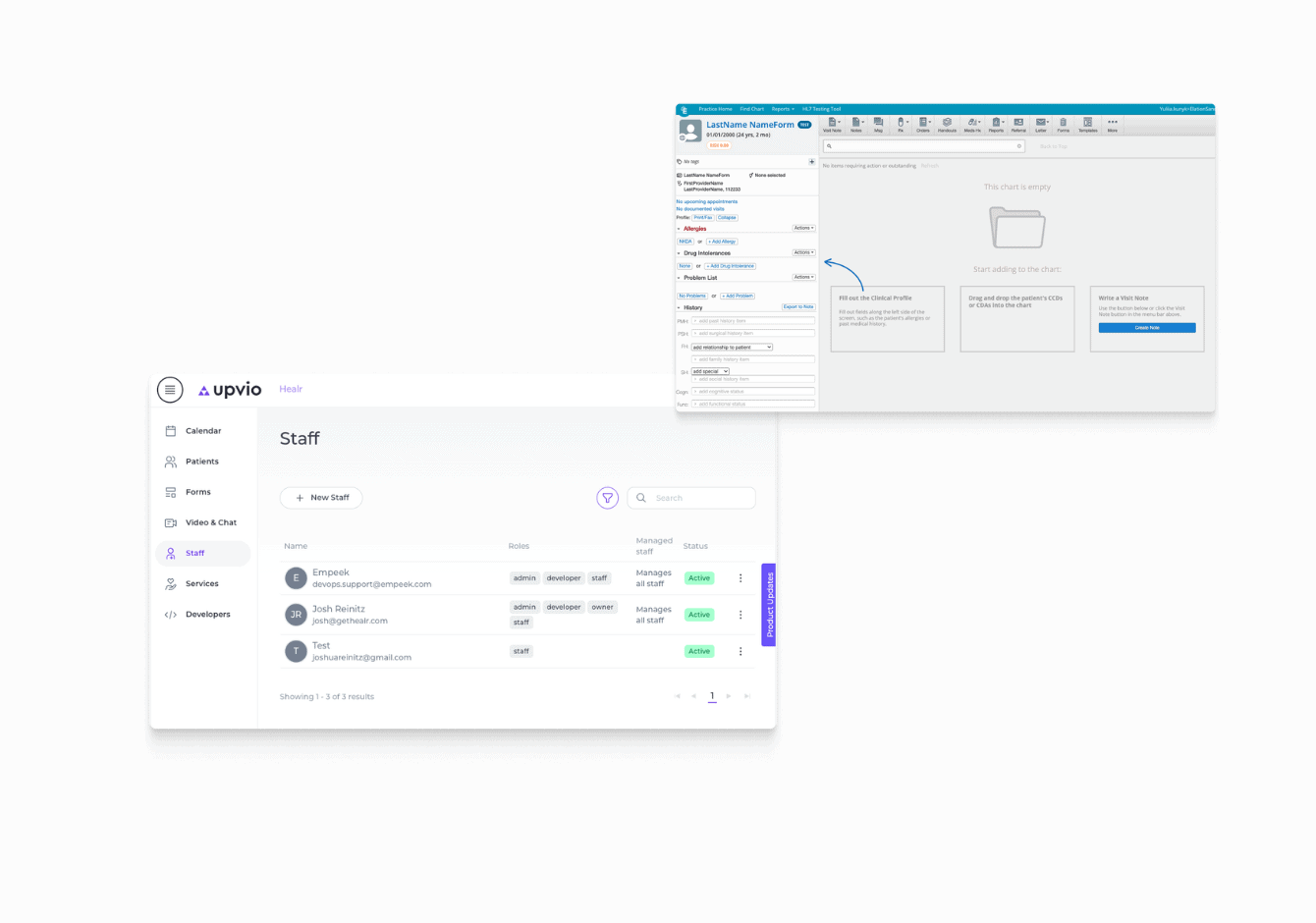
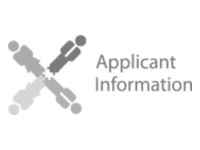
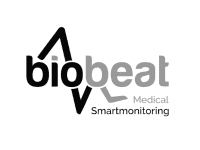
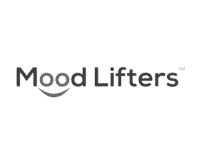
Contact Us Today to Select the Cooperation Approach That Suits Your Needs
Schedule a CallSelecting the right technology partner is crucial when undertaking healthcare IT initiatives. Here are some key reasons to consider our specialized healthcare software development team:
Our team has lots of experience in clinical environments. We have also spent years designing, developing, and integrating software solutions. We work with unique workflows, challenges, and rules in healthcare. They vary across the ecosystem — from core clinical systems to emerging health IoT platforms.
We offer varied cooperation models to meet diverse client requirements. These include time and materials arrangements for variable-scope projects, dedicated development teams for long-term initiatives, and project-based pricing for well-defined requirements. This spectrum of engagement models aligns with organizations’ budgets, timelines, and ongoing development needs.
Skilled account managers are assigned to collaborate with each client as an integrated part of their team throughout the project lifecycle. These client partners provide ongoing guidance, facilitate collaboration between business users and technical teams, convey status reports, flag potential issues early, and ensure initiatives progress smoothly according to objectives.
Our free consultation process is designed to help us better understand your unique healthcare business needs and develop a customized recommendation for your software and IT initiatives:
We will schedule an introductory call with you at your convenience to discuss your organization’s specific healthcare business needs, objectives, issues impacting business performance, key workflows, and inefficiencies.
Based on insights into your healthcare operations from the call, we develop and present an approach and set of tailored software recommendations to address your specific workflow requirements and issues to help achieve your business goals.
Our complimentary consultation is with no obligation or commitment to proceed with a project required. It focuses on gaining insights into your needs so we can outline the most viable healthcare IT strategy aligned with your operational environment.
The cost of custom staffing software depends on many variables. Factors such as the software’s complexity, needed features, chosen technology, and the team’s location and expertise add to the cost. So do any custom integrations. Contact us for a more precise estimate tailored to your project requirements.
Medical staffing software is a technology designed for healthcare organizations to better manage their clinical and non-clinical workforces. It’s an enterprise solution that streamlines and automates complex staffing tasks.
Medical staffing software must follow many laws and rules. These are about privacy, security, and accessibility. Some key legal and regulatory requirements include:
Licensing requirements. Some healthcare software may need special licensing. Or, it may need special credentials to use legally. Staffing software vendors must follow any relevant licensing rules.
Medical staffing software is designed to help healthcare facilities to manage their staffing and personnel issues well. Some critical features are:
Robust data security and complete HIPAA compliance is critical in our medical software development. Some of our key approaches include:
Contracts. We maintain business associate agreements and vendor contracts to HIPAA standards. This ensures that partners protect PHI.
Developing robust medical software presents some unique challenges. If you do not overcome them, you could undermine the end product’s quality, security, and compliance. Some significant pitfalls are:
Data silos. Software that does not readily share essential data with facility EHR and systems creates major efficiency and continuity-of-care challenges for providers. APIs are key.
Robust customer support and regular maintenance is crucial for medical software to deliver ongoing value. Some key requirements include:
Custom integration. Support for integrating with existing healthcare IT systems via APIs and interfaces is key for usability within complex hospital ecosystems.
Compatibility with existing health IT systems is essential for strong medical staffing software solutions.
The staffing software has open APIs and connectors. They allow two-way data sharing with systems like EHRs, HRIS, scheduling, payroll, and time & attendance software. Industry standards like HL7 and FHIR support easy data transmission between systems. They do this per facility preferences. The endpoints and payloads are configurable. They are configured for sending or receiving specific staffing data to or from the integrated platforms. This configuration is based on use case needs.
On the user interface side, single sign-on allows seamless access to the staffing system and EHR. Contextual embedding will show relevant widgets or info on other platforms. It’s for clinical staffing insights without changing systems. Robust integration testing validates accuracy and performance before going live. Our tech team works with hospital IT leads. They ensure tight, flexible integration. It covers bedside clinical systems and back-office platforms. This creates a single data system. It gives hiring managers, schedulers, and staff access to workforce information. It makes staffing workflows smoother across the whole hospital.